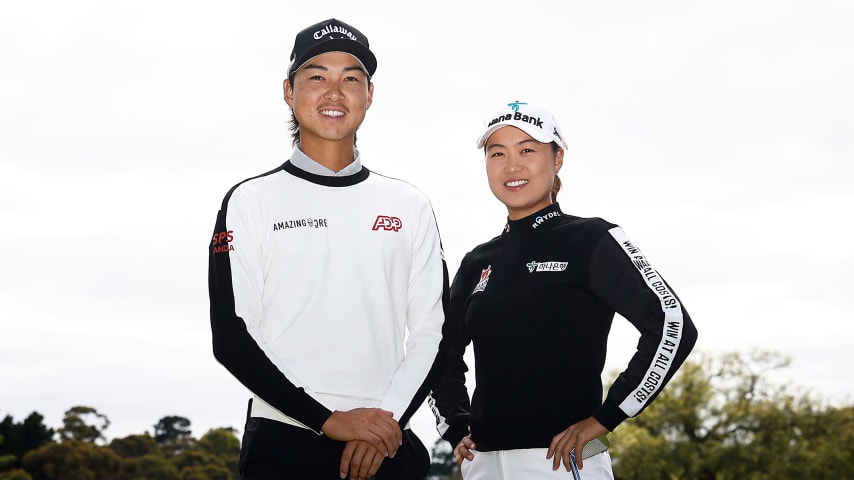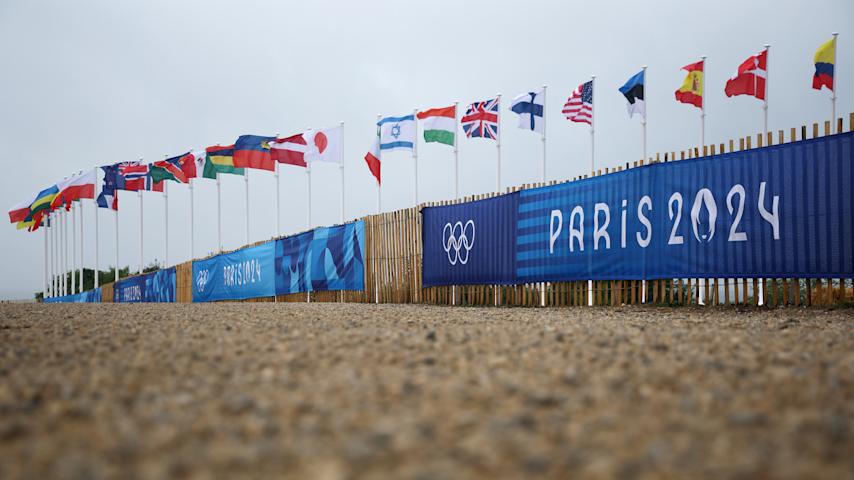Golf’s return to the Games: What might have been
5 Min Read
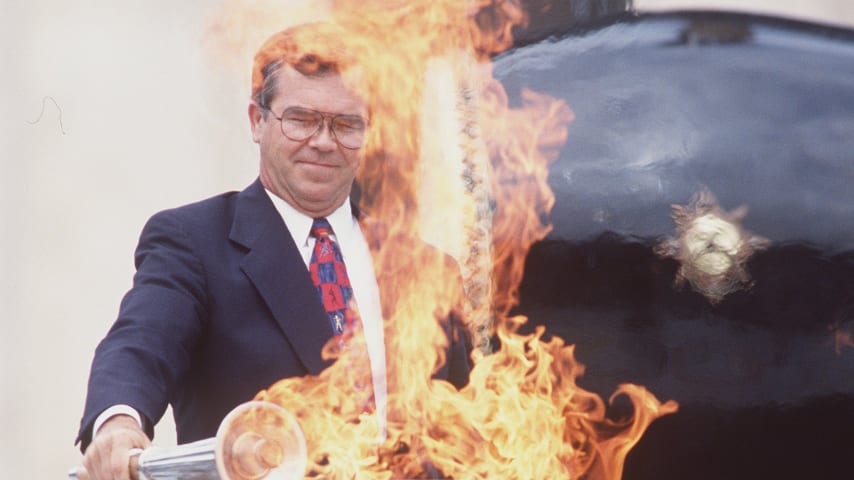
President and CEO of the Atlanta Olympic Committee Billy Payne lights the Olympic torch from the original Athens flame at the Los Angeles Memorial Coliseum before beginning the cross-country relay to Atlanta, Georgia. (Getty Images/J.D)
Written by Laury Livsey
The shirt looks like a fake, something out of a Hong Kong factory that you would pick up for a few bucks on New York’s Canal Street.
But then there’s the hat. You can’t miss the hat, and while it has the same familiar logo as the shirt, the hat has signatures on the bill, the autographs in Sharpie of people that golf aficionados might recognize: Deane Beman, Charlie Mechem, LeRoy Walker, Stuart Bloch and – not insignificantly – Jack Stephens. Billy Payne was the last to sign.
Definitely not a fake, right?
The signatures add an air of legitimacy to both articles of clothing because, well, the shirt and hat are legit.
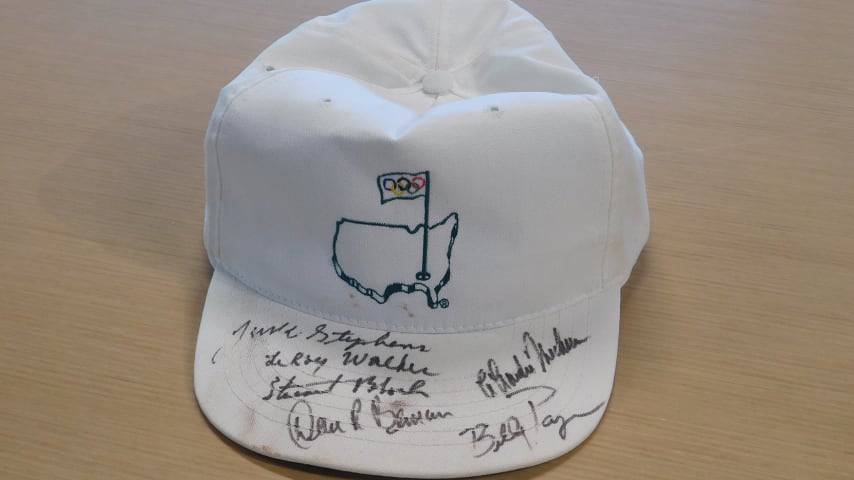
Signatures from Deane Beman, Charlie Mechem, LeRoy Walker, Stuart Bloch, Jack Stephens and Billy Payne on the Augusta National Golf Club logo with Olympic variation . (Courtesy Laury Livsey)
Yes, that indeed is a variation of the Augusta National Golf Club logo on both, the recognizable emblem with the golf pin flag emerging from an outline of the United States. But replacing the familiar yellow stitching on the flag on those two unique items are the five Olympic rings.
Here’s why one of the more famous logo alterations in history – albeit a temporary one – did occur.
In 1992, Payne, the President and CEO of the Atlanta Committee for the Olympic Games, had an idea for the sporting extravaganza he would oversee four years in the future, and it involved Augusta National, a club of some reputation.
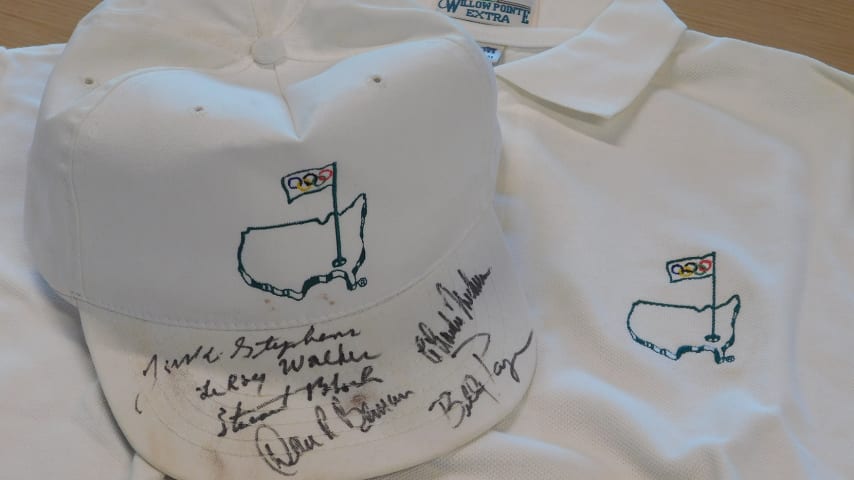
Signatures from Deane Beman, Charlie Mechem, LeRoy Walker, Stuart Bloch, Jack Stephens and Billy Payne on the Augusta National Golf Club logo with Olympic variation . (Courtesy Laury Livsey)
Would one of the most famous golf courses in the world be willing to host Olympic competition? Would the United States’ primary golf governing bodies support the idea? And would the International Olympic Committee add men’s and women’s golf as an Olympic Sport for the 1996 Games in Georgia?
Yes, yes, and … we’re about to find out.
The hat and shirt indicated Augusta National’s cooperation, the alteration to Augusta National’s legendary logo – no small thing – coming with the blessing of Stephens, the club’s chairman at the time.
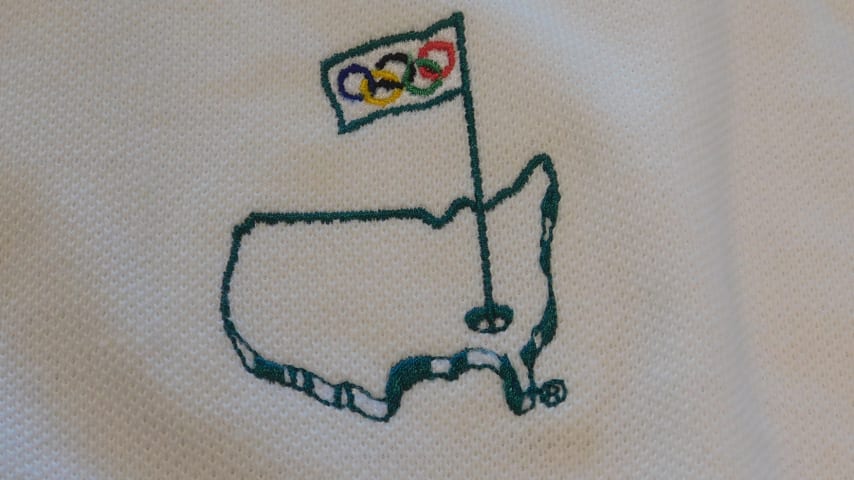
Payne also determined he needed to convince the significant golf organizations in the U.S. that golf in the Olympics was a good idea. That came together, too, and on a late fall Sunday morning, outside Eisenhower Cabin on the grounds of Augusta National, Stephens joined Payne, and they stood with Beman and Mechem, the Commissioners of the PGA TOUR and LPGA, respectively. Also in attendance were Walker, the President of the United States Olympic Committee, and Bloch, the President of the United States Golf Association. They would unitedly present their grand golf idea.
Stephens invited select media members to the club and then told the assembled writers that Augusta National members were “trying to send a message that we’re for both men's and women’s golf.”
Bloch, besides his role with the USGA, was also the joint chairman of the World Amateur Golf Council, said, “Golf in the Olympics is a very positive step forward for golf, and we are extremely excited about the possibility of being part of the Atlanta Games.”
Finally, Beman weighed in, saying: “We are thrilled that the game of golf would be exposed to billions of people around the world as part of the greatest sports spectacle in history, and to have the competition at Augusta National is a huge bonus.”
The group’s plan was an amateurs-only competition despite the emerging Olympic trend of professionals participating in the Games. A maximum of three men and three women from any country would compete, there would be a qualifying period for the athletes tied to rankings, and, ultimately, they would play in 72-hole, stroke-play tournaments held the last week of July and the first week of August four years in the future.
With everything laid out, the whole plan hinged on what the International Olympic Committee decided, under the direction of IOC President Juan Antonio Samaranch. Would the IOC add golf to the official program?
The answer, in an indirect way, eventually was no, without really an explanation.
On Jan. 28, 87 days after the Augusta National get-together, Samaranch, speaking to the Italian newspaper La Gazzetta dello Sport, matter-of-factly said, “I think that no new sports will be admitted for Atlanta.”
That all but sealed any hope Atlanta had of getting golf into its Games. Payne’s organization could read the writing on the wall, and rather than continue what it saw as a futile effort, it released a statement the following day: “The Atlanta Committee for the Olympic Games has therefore determined that it must redirect the considerable time and effort it has spent on golf to other important issues in the preparation of the Games.”
Payne, who, ironically, would later join Augusta National as a member and then serve as the club’s Chairman from 2006 to 2017, admitted to the New York Times that the decision to withdraw Atlanta’s petition for getting golf in the Olympics was actually quite simple. “If Samaranch is against the sport, it’s going to be fairly difficult to get this done,” Payne said. “When he says something, it usually has significant meaning.”
Stephens, who died in 2005, was philosophical once it became apparent that Olympians would not be gracing Augusta National’s fairways and greens. “Our desire was to help advance the game of golf worldwide. We regret that an Olympic golf competition will not be possible in 1996.”
The Atlanta Games eventually went without golf, as did four additional Games. Then, Brazil welcomed the sport to the 2016 iteration of the every-four-years event; Tokyo, too. Paris is next up, with golf now entrenched as an official sport and getting to where it is on the Olympic landscape via a circuitous route that started two decades earlier, in Augusta, Georgia.




